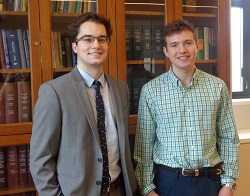Program Areas
 Biennial Household and Behavioral Finance Symposium
Biennial Household and Behavioral Finance Symposium
The IBHF hosts a biennial Household and Behavioral Finance Symposium which seeks to explore the frontiers of empirical and policy related research by presenting cutting-edge research on topics related to household finance and behavioral finance. The IBHF invites scholars to present their current research on topics broadly related to behavioral or household finance issues. Symposium participants include academics and practitioners with special expertise in either area.
Click link above for more details.
The last symposium was held virtually, June 7-9, 2021. The keynote speaker was Dr. Terrance Odean, Rudd Family Foundation Chair, Haas School of Business, University of California Berkeley.
Visiting Fellows Program
Scholars from other universities, research institutes, and government agencies can apply to become IBHF visiting fellows. Fellows spend time in residence at Cornell's Dyson School of Applied Economics and Management to engage in research, discussions, and scholarly collaborations concerned with behavioral and household finance issues. Fellows should have an independent source of funding and a master's degree, doctorate, or equivalent degree in one of a variety of disciplines: economics, finance, psychology, or a related social science discipline.
VISITING FELLOWS APPLICATION FORM
Post-Doctoral Research Associates Program
Outstanding researchers can apply for appointments as post-doctoral research associates. Post-doctoral research associates work closely with IBHF affiliates on research related to behavioral and household finance. In addition, post-doctoral associates can assist with the development of IBHF financial education outreach programs and workshops. Post-doctoral research associates also are able to participate in all IBHF activities including faculty-graduate seminars, workshops, and public lectures, and enjoy access to a wide range of other activities throughout the University. Applicants should have received a doctorate or equivalent degree within three years of application and will not be employed by another institution during their stay at Cornell. The program will not support work toward the completion of a degree.
White Paper Series
White papers written by IBHF research affiliates, research scholars, and visiting fellows provide legislators, media, and practitioners with research-based information to better inform investment decisions, tax-related policies, pension-related policies, and regulation of financial markets.

2015-16 IBHF Research Scholars (from left to right: Luka Jankovic and Shawn Miles)
Research Scholars Program
IBHF Research Affiliates advise and mentor undergraduate and graduate students in the Dyson School of Applied Economics and Management. These research scholars work on finance related research and financial education outreach projects.
Financial Education and Outreach
The IBHF financial education workshops and outreach programs provide individuals with financial management information and tools. The goal of the programs is to provide information that enables individuals and households to make better investment and financial decisions.


